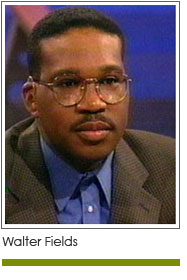 It has become cliché to reference a crisis among Black men. The truth is the crisis is starting way before Black males reach manhood. Black boys are in trouble and we are floundering in our efforts to save them. Yes, young Black girls are also in a crisis, and as the father of a 12-year-old daughter, I am particularly sensitized to what our young women are facing. Yet, our young boys have become so marginal in our society that their plight deserves our full attention.
It has become cliché to reference a crisis among Black men. The truth is the crisis is starting way before Black males reach manhood. Black boys are in trouble and we are floundering in our efforts to save them. Yes, young Black girls are also in a crisis, and as the father of a 12-year-old daughter, I am particularly sensitized to what our young women are facing. Yet, our young boys have become so marginal in our society that their plight deserves our full attention.
Two recent reports – from the Schott Foundation and the Southern Poverty Law Center – highlight the degree to which young Black boys are losing ground in the classroom. The Schott Foundation’s 50 State Report on Public Education and Black Males for 2010, titled Yes We Can, reveals that nationally only 47% of Black males graduate from high school. In some places, like New York City and Detroit, that number is 28% and 27% percent respectively. The Southern Poverty Law Center report, Suspended Education: Urban Middle Schools in Crisis examines the disproportionate expulsion of Black boys from classrooms in the nation’s middle schools and their suspensions out-of-school. Both reports paint a frightening picture of the diminished opportunities for Black boys in this nation.
It is clear that a cradle to college commitment is now required to save young Black boys and that much of that effort is particularly important at the middle school level. The alarming dropout numbers and incarceration rate for Black males is attributable to systemic failures to support them earlier in their childhood. Complicating matters further is the absence of Black men from many households and the void it creates in the lives of Black boys. We should not be surprised when we see young Black men opt for the streets and find solace in gangs when we have utterly failed to provide the support they need during their formative years. Schott Foundation President Dr. John H. Jackson notes, “A deliberate, intense focus is needed to disrupt and redirect the current educational trajectory for Black males.” I could not agree more.
Do not be confused and think that this problem is only in the inner cities. Young Black boys in suburban communities are just as vulnerable and many crumble under the isolation they experience. Simple geography will not save Black boys, many of whom learn early that their life is valued at a discount rate and who society views as a nuisance or threat before they reach their teen years. For these boys, childhood is fleeting and the joys children should reasonably expect are beyond their reach. In the end, we all lose when robbed of the contributions these boys could make, as men, to our nation and the world if we had given them a chance as children.
We must pursue every effort possible – from community engagement and mentoring to wholesale education reform –to change the life chances of Black boys. It always seems melodramatic when people paint the worst possible scenario for the future of Black people in our country. In this case, however, the doomsday portrait is a very real possibility. The grim school statistics only tell part of the story. Travel through many Black neighborhoods and the idleness of young Black men is very evident, as is their “relocation” to local jails and state corrections facilities, and their premature deaths. I can fully appreciate the frustrations of many Black women against the implosion of Black men, a process that starts during their adolescence.
While we push for school reform, and I speak primarily of public education and not charter schools, Blacks must make an investment in Black boys. Rather than wait for the gang, the warden or the grave to claim our boys, we must use every means at our disposal to intervene in their lives. It is time for every institution in our community, churches, Black colleges and fraternities, to develop on-the-ground programs that will embrace Black boys and give them positive life alternatives. Individuals can play a role too and should find a way to get involved with Black boys in their communities.
The reports from the Schott Foundation and the Southern Poverty Law Center give us fair warning of the plight of Black boys but if we continue to ignore the problem, it will come at our own expense.
Walter Fields is the Executive Editor of NorthStarNews.com.
















